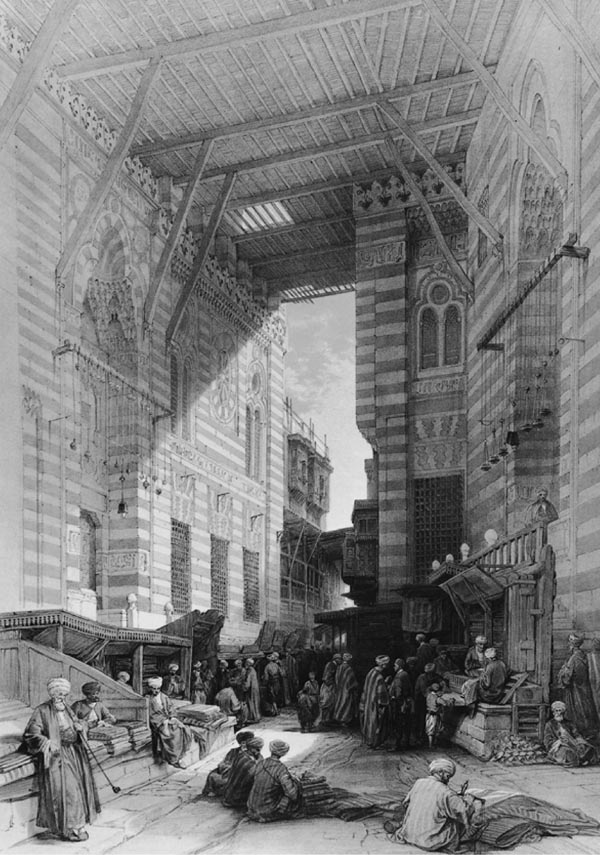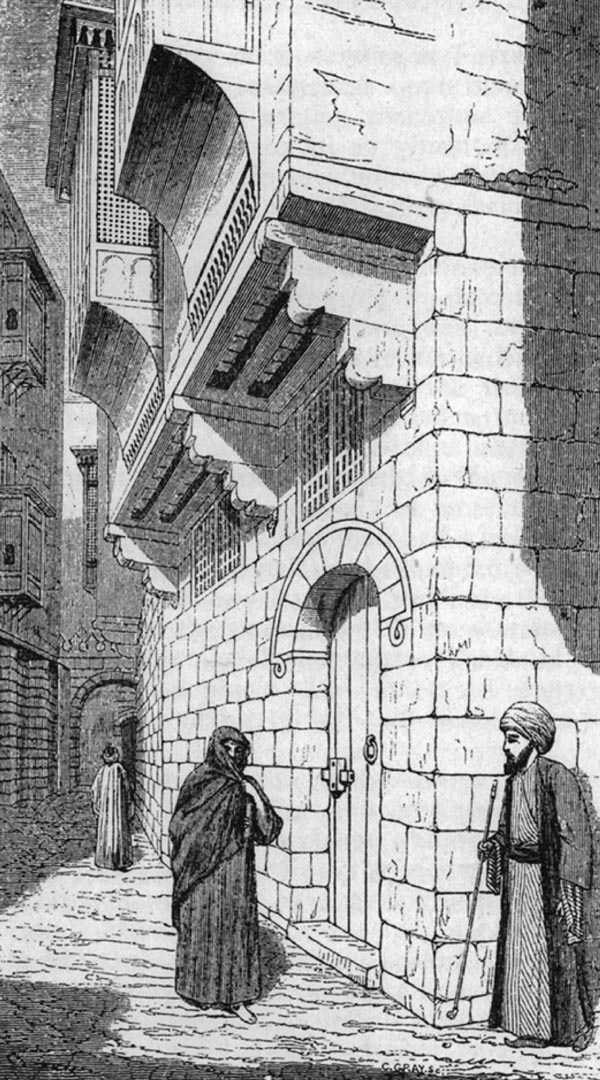旅行的艺术:动机 Ⅲ 异国情调-5
5
5
如果我们了解福楼拜的这些想法,我们就会明白他对中东有着特别的兴趣决非偶然,也不只是追求时尚。东方同他的性情有着逻辑上必然的契合。我们可以在他个性中的一些主要方面找出他强烈喜欢埃及的理由。他自身的一些想法和价值观念并不见容于他所生活的社会,但在埃及,这些想法和观念却能大行其道。
Given all this, it appears to be no coincidence, no mere accident of fashion, that it was specifically the Middle East that Flaubert was interested in. It was temperamentally a logical fit. What he loved in Egypt could be traced back to central facets of his personality. Egypt lent support to ideas and values that were part of his identity but for which his own society had had little sympathy.
(Ⅰ)喧嚣中的异域情调
(I)THE EXOTICISM OF CHAOS
从下船登上亚历山大的第一天起,福楼拜就注意到埃及生活中的喧嚣。这种喧嚣既是视觉上的,也是听觉上的,如水手们的叫喊声、努比亚搬运工招揽生意的叫喊声、商人们讨价还价的声音、鸡被杀死时发出的声音、驴子被鞭打的声音、骆驼低沉的呻吟,这一切都让他感到很自在。他说,在街上有“粗嗄的喉音,类似野兽的吼叫,有笑声,到处可见白色的衣袍,在厚唇间闪烁的洁白牙齿,黑人塌塌的鼻子、脏脏的脚丫、项链和手镯”。“那感觉就像沉迷于贝多芬的交响乐之中,铜管乐器声震耳欲聋,低音乐器声隆隆如雷,长笛声凄然欲绝,任意摆荡;每种声音都让你挥之不去,它们捏着你,你越是想让注意力集中在某处,你越是无法把握整体……在城中各处走动时,当你的视线落在停满白鹳的光塔之上,抑或是落在房屋露台上横躺在太阳底下、疲乏的奴隶们身上,或者是凝视靠墙生长的西克莫无花果树的枝杈,你会发觉,这里的色彩是如此的斑斓炫目,你如同在观看不停顿的焰火表演,而你贫乏的想象力完全无所适从。与此同时,驼铃萦绕耳畔,大群的黑山羊咩咩直叫,还有马嘶驴鸣,商贩吆喝,不绝于耳……”
From the day he disembarked in Alexandria, Flaubert noticed and felt at home in the chaos, both visual and auditory, of Egyptian life: boatmen shouting, Nubian porters hawking, merchants bargaining, the sounds of chickens being killed, donkeys being whipped, camels groaning. In the streets there were, he said, 'guttural intonations that sound like the cries of wild beasts, and laughter, and flowing white robes, and ivory teeth flashing between thick lips and flat negro noses, and dusty feet and necklaces and bracelets'. 'It is like being hurled while still asleep into the midst of a Beethoven symphony, with the brasses at their most ear-splitting, the basses rumbling, and the flutes sighing away; each detail reaches out to grip you; it pinches you; and the more you concentrate on it the less you grasp the whole … it is such a bewildering chaos of colours that your poor imagination is dazzled as though by continuous fireworks as you go about staring at minarets thick with white storks, at tired slaves stretched out in the sun on house terraces, at the patterns of sycamore branches against walls, with camel bells ringing in your ears and great herds of black goats bleating in the streets amid the horses and the donkeys and the pedlars.'
福楼拜有丰富的美感。他喜欢紫色、金色和碧绿色,对埃及建筑的颜色更是欢喜不已。英国旅行家爱德华·莱恩在其著作《现代埃及人的生活方式和社会风俗》中对埃及商人住所的典型设计作了如下描述:“除了斜条格构的窗户,还有一些别的装饰,如彩色玻璃拼成一些花束和孔雀图案,还有一些灰色的和艳彩的装饰,或者仅仅是一些奇幻的图案……在一些公寓抹有泥灰的墙面上,有当地穆斯林艺人简单率真的画作,有画下埃及 [8] 神殿的,有画穆罕默德墓的,也有画花卉及其他东西的……有时墙面只刻绘一些阿拉伯的格言警句,用的是美术字体,也不失为一种漂亮的装饰。”
Flaubert's aesthetic was rich. He liked purple, gold and turquoise and so welcomed the colours of Egyptian architecture. In his book The Manners and Customs of the Modern Egyptians , first published in 1833 and revised in 1842, the English traveller Edward Lane described the interiors typical of Egyptian merchants' houses: 'There are, besides the windows of lattice-work, others, of coloured glass, representing bunches of flowers, peacocks, and other gay and gaudy objects, or merely fanciful patterns … On the plastered walls of some apartments are rude paintings of the temple of Mekkeh, or of the tomb of the Prophet, or of flowers and other objects, executed by native Muslim artists … Sometimes the walls are beautifully ornamented with Arabic inscriptions of maxims in an embellished style.'

路易斯·阿格仿大卫·罗伯斯的石版画《开罗的丝布市场》
埃及的这种巴罗克风格还延伸到其语言上,即便是最普通场合使用的语言也不例外。福楼拜曾记下了这样一些例子:“刚不久,我在一家商店看花草种子时,有位曾接受我的东西的女人对我说:‘祝福您,我亲爱的大人:神保佑您平安返回故里’……当麦克斯问一位车夫是否很累,他得到的回答是:‘能得到您长久的注目,我感到万分荣幸。’”
The baroque quality of Egypt extended to the language used by Egyptians in even the most ordinary situations. Flaubert recorded examples: 'A while ago when I was looking at seeds in a shop a woman to whom I had given something said, “Blessings on you, my sweet Lord: God grant that you return safe and sound to your native land” … When [Maxime du Camp] asked a groom if he wasn't tired, the answer was: “The pleasure of being seen by you suffices.”'
为什么这种声的喧嚣和色的斑斓能打动福楼拜?福楼拜认为,生活本质上是混乱和喧嚣的,除了艺术作品,其他创造秩序的企图只是吹毛求疵和假正经,因而背离我们的现实生活。1851年9月,埃及之旅结束才几个月,他便到伦敦旅行。在给路易斯·科莱的信中,他谈及他的感受:“我们刚去了海格特墓地 [9] 。相形于埃及和伊特拉斯坎 [10] 的建筑,这墓地有太多矫饰和做作!它太过整饬,太过清洁!似乎墓里的人都是带着洁白的手套死去的。我讨厌墓地周围那些有着平整花圃且群花绽放的小花园。那种对称的布局在我看来似乎是源自于某部拙劣小说中的描写。至于墓地,我还是喜欢那些破败、坍塌和荒芜的墓地,其四围荆棘丛生,杂草疯长,还有一只从附近原野跑来的牛在那里悠闲地啃着嫩草。毫无疑问,这肯定比看到穿着制服的警察要强。秩序是多么荒谬的东西!”
Why did the chaos, the richness, so touch Flaubert? Because of his belief that life is fundamentally chaotic and that, aside from art, attempts to create order imply a censorious and prudish denial of our condition. He expressed his feelings to his mistress Louise Colet in a letter written during a trip to London in September 1851, only a few months after his return from Egypt: 'We've just come back from a walk in Highgate cemetery. What gross corruption of Egyptian and Etruscan architecture it all is! How neat and tidy it is! The people in there seem to have died wearing white gloves. I hate little gardens around graves, with well-raked flower beds and flowers in bloom. This antithesis has always seemed to me to have come out of a bad novel. When it comes to cemeteries, I like those that are run-down, ravaged, in ruins, full of thorns or tall weeds and where a cow escaped from a neigbouring field has come to graze quietly. Admit that this is better than some policeman in uniform! How stupid order is!'

《开罗的私人宅第》,出自爱德华·莱恩1842年出版的《现代埃及人》一书
(Ⅱ)拉屎的驴的异域情调
(II)THE EXOTICISM OF SHITTING DONKEYS
“昨天我们在开罗最好的一家餐馆用餐,”福楼拜回到巴黎几个月后写道,“和我们同时在店里的还有一只正在拉屎的驴子,一个在餐馆一角撒尿的男人。没有人觉得这有任何的不妥,也没有人表示任何的不满。”在福楼拜看来,他们这么做是对的。
Yesterday we were at a café which is one of the best in Cairo,' wrote Flaubert a few months after his arrival in the capital, 'and where there were at the same time as ourselves, inside, a donkey shitting and a gentleman pissing in a corner. No one finds that odd; no one says anything.' And, in Flaubert's eyes, they were right not to.
福楼拜思想中的一个核心部分是,他认为人不仅仅是有思想的动物,同时也是需要拉屎撒尿的动物,我们必须把这种率直的理念纳入世界观。他对舍瓦利耶说:“我们的身体里有泥土和粪便,还有比猪和阴虱更卑劣的本性,我不相信它们包容着任何纯洁和精神的东西。”这并不是说人类没有任何高于动物的地方。只是福楼拜所处时代的伪善和假道学使他萌生心念,以人类的种种不足来警策世人。因此,他不时地会站在当众小便者的一边,有时,他甚至同情马奎斯·德·萨德[11] 的观点,为鸡奸、强奸、乱伦和未成年者性行为等作辩护。(他曾对舍瓦利耶说:“我刚读了知名评论家让宁关于萨德的传记文章。这文章使我心生憎恶——是对让宁的憎恶,因为很显然,他是在以仁慈、道义和被奸污的处女的立场进行说教……”)
Central to Flaubert's philosophy was the belief that we are not simply spiritual creatures, but also pissing and shitting ones and that we should integrate the ramifications of this blunt idea into our view of the world. 'I can't believe that our body, composed as it is of mud and shit and equipped with instincts lower than those of the pig or the crab-louse, contains anything pure and immaterial,' he told Ernest Chevalier. Which wasn't to say that we were without any higher dimensions. It was just that the prudery and self-righteousness of the age aroused in Flaubert a desire to remind others of mankind's impurities. And occasionally to take the side of café urinators-or even the Marquis de Sade, advocate of buggery, incest, rape and underage sex. ('I've just read a biographical article about de Sade by [the famous critic] Janin,' he informed Chevalier, 'which filled me with revulsion-revulsion against Janin, needless to say; who held forth on behalf of morality, philanthropy, deflowered virgins…')
福楼拜发现埃及文化能坦然接受生活的双重性:粪便—心智,生—死,纯洁—性欲,疯狂—理智,对此,他乐于接受。人们可以在餐馆里尽情地打嗝。在开罗街头,一个只有六七岁的小男孩经过福楼拜的身旁时高声问候说:“我祝福您百事兴旺,特别祝福您有一根长长的肉棍。”爱德华·莱恩也注意到了埃及文化中的双重性,但可以想见,他的反应更近于让宁而非福楼拜:“在埃及,人们不分性别、不计身份,一味耽溺于最低级的、庸俗的交谈,即便最有德性、最受尊敬的女性也不例外。从那些受过良好教育的人们口中,你同样能听到淫秽的话语,这些话语只适合于在低级的妓院里使用;在我们国家连妓女都极可能羞于启齿的事物和话题,在埃及却为那些最为优雅的女性所津津乐道,她们丝毫不曾意识到她们的谈话是多么的失礼,也毫不顾及在场的男性听众。”
Flaubert found and welcomed in Egyptian culture a readiness to accept life's duality: shit-mind, death-life, sexuality-purity, madness-sanity. People belched to their hearts' content in restaurants. A boy of six or seven, passing Flaubert in a Cairo street, cried out in greeting, 'I wish you all kinds of prosperity, especially a long prick.' Edward Lane also noticed this duality, though reacted to it more in the manner of Janin than of Flaubert: 'The most immodest freedom of conversation is indulged in by persons of both sexes, and of every station of life, in Egypt; even by the most virtuous and respectable women. From persons of the best education, expressions are often heard so obscene as only to be fit for a low brothel; and things are named, and subjects talked of, by the most genteel women, without any idea of their being indecorous, in the hearing of men, that many prostitutes in our country would probably abstain from mentioning.'
(Ⅲ)骆驼所体现的异域情调
(III)THE EXOTICISM OF CAMELS
“骆驼是最让人心动的东西之一,”福楼拜在开罗时写道,“它是个奇怪的动物,行走时有如驴子,步履蹒跚,同时还像天鹅般摇晃着自己的脖子,我很喜欢看着它,并乐此不疲。它们的叫声短促,伴着喉部的颤音,我已经摹仿很久,嗓子都有些累了,真希望我能摹仿出它的叫声,但这的确很难。”离开埃及几个月后,他写信给一位亲友,列出了在埃及最让他心动的事物:金字塔、凯尔奈克的庙宇、君王谷、开罗的一些舞蹈艺人,一位叫比尔贝斯的画家。“但最能打动我的还是骆驼(千万别以为我是在开玩笑),你很少能找到别的什么,比忧郁善感的骆驼更奇特、更优雅。你必须得到沙漠中,看着地平线上,它们像士兵一样排成单列向前行进。它们的脖子,鸵鸟般前伸,不断前行……”
One of the finest things is the camel,' wrote Flaubert from Cairo. 'I never tire of watching this strange beast that lurches like a donkey and sways its neck like a swan. Its cry is something that I wear myself out trying to imitate-I hope to bring it back with me-but it's hard to reproduce-a rattle with a kind of tremulous gargling as an accompaniment.' A few months after leaving Egypt, he wrote to a family friend listing all that had most impressed him in the country: the Pyramids, the temple at Karnak, the Valley of the Kings, some dancers in Cairo, a painter called Hassan el Bilbeis. 'But my real passion is the camel (please don't think I'm joking), nothing has a more singular grace than this melancholic animal. You have to see a group of them in the desert when they advance in single file across the horizon, like soldiers; their necks stick out like those of ostriches, and they keep going, going … '
为什么福楼拜如此欣赏骆驼?一个重要的原因是他认同骆驼的恬淡韧毅和朴拙单纯的天性。骆驼忧伤的表情,骆驼拙朴中透出的宿命般的生存能力,都让他感动。埃及人的天性中似乎也有骆驼的影子:在静默中表现出一种勇毅,一份谦恭,同福楼拜周围的法国中产阶层的傲慢天性正好相反。
Why did Flaubert admire the camel so much? Because he identified with its stoicism and ungainliness. He was touched by its sad expression, and the combination of awkwardness and fatalistic resilience. The people of Egypt seemed to share some of the qualities of the camel: a silent strength and humility that contrasted with the bourgeois arrogance of Flaubert's Normand neighbours.
从少年时代起,福楼拜就对法国的自我优越深恶痛绝——在其小说《包法利夫人》中,通过对药剂师霍梅斯这位最可憎的人物的残酷的科学信仰的描写,表达的正是这种深恶痛绝。他还给未来描绘了一个更为悲观的前景:“一天又结束了,呸!这是一个威力无穷的词,它能在你遭遇任何人间苦境时给你带来安慰,所以我喜欢反复说:呸!呸!”这是一种处世的哲学,在埃及,可以在骆驼伤感、尊贵却带一点调皮的眼神中找到答案。
Flaubert had since boyhood resented the optimism of his countrya resentment expressed in Madame Bovary in the description of the cruel scientific faith of the most detestable character, the pharmacist, Homaisand he held a predictably darker outlook: 'At the end of the day, shit. With that mighty word, you can console yourself for all human miseries, so I enjoy repeating it: shit, shit.' It was a philosophy reflected in the sad, noble yet slightly mischievous eyes of the Egyptian camel.
- 频道推荐
- |
- 全站推荐
- 推荐下载
- 网站推荐


















